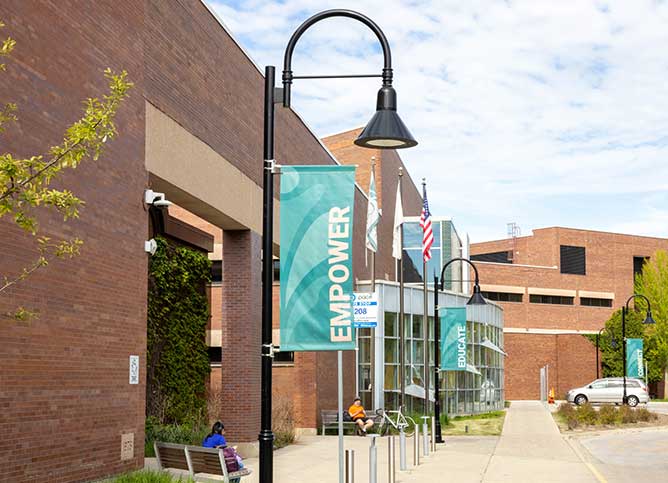Commercial buildings are some of the largest energy consumers in the U.S. making this career ideal for those who want to make a difference in a hands-on way.
Oakton College’s Commercial Buildings Energy Systems Certificate prepares you for this in-demand field focused on sustainable building management.
This 32-credit program teaches you the skills to improve energy use in commercial spaces, like saving money and resources while keeping buildings safe and efficient.
Our program offers direct experience in commercial HVAC and energy auditing. You will learn how to select, size, and apply systems to control air quality, heating, and cooling. You will also cover conducting energy audits and managing building energy systems.
These courses help you build practical skills valued in today’s job market.
Oakton offers flexible learning options to help you balance work, life and education, whether you’re new to college or returning to gain new skills.
Oakton’s Commercial Buildings Energy Systems program opens doors to roles in energy management, sustainable building operations and beyond.
Enrolling at Oakton College can save you thousands of dollars and help you earn more over the course of your career. Our tuition is among the lowest in the region, and we offer many ways to bring your costs down even more.
99 percent of Oakton students graduate without debt.
To help you get there, you can apply for a scholarship, which you don’t have to pay back. We award $12 million in scholarships annually. Financial Aid includes grants, loans, and other forms of financial assistance that can reduce your costs of attending college.
We offer payment options that give you control over how you pay. Pay all at once or spread your payments over the course of the semester.
Learn more about your options for paying for your education

Oakton's Academic Catalog is your guide to programs, course descriptions and policies. You will find an overview of what classes are required for your certificate/degree, your pathway (or suggested sequence of classwork), along with learning outcomes.
Connecting with an advisor before you start the enrollment process can help you on your best path forward.
View the Course Catalog for the Commercial Buildings Energy Systems Certificate
Christopher J Hirst
Associate Professor / Chair
chirst@oakton.edu
(847) 635-1955
Dave Cangelosi
Lecturer
dcangelo@oakton.edu
James Coates
Lecturer
jcoates@oakton.edu
Room B206, Skokie
David Dulin
Lecturer
ddulin@oakton.edu
James Dunn
Lecturer
jdunn@oakton.edu
Dave Arvans
Chief Facilities Engineer
Elgin Hospital
Robert Axelrod, PE
President
Cooling Equipment Service
Jim Coates
Director of Training
International Union of Operating Engineers
Mike Kaplan
Service Manager
Kaplan’s Heating and Cooling
Jack O’Rourke
V.P. Engineering Manager
Able Engineering
Allen Schwartz, PE
Director of Engineering
Ferguson Heating and Cooling Supply
John Smith
President
Effective Air
Licensure Requirements: Each state and territory has different licensure and certification requirements. Oakton has researched and/or contacted state licensing authorities to confirm that the program meets the educational requirements leading to professional licensure or certification.
Licensure information is reviewed and updated on this site in June of each year. As of June 1, 2023, we have determined that individuals that after successful completion of the EPA Section 608 Certification course curriculum:
Meets the education requirements leading to licensure/certification in these states and U.S. Territories: Alabama, Alaska, American Samoa, Arizona, Arkansas, California, Colorado, Connecticut, Delaware, District of Columbia, Florida, Georgia, Guam, Hawaii, Idaho, Illinois, Indiana, Iowa, Kansas, Kentucky, Louisiana, Maine, Maryland, Massachusetts, Michigan, Minnesota, Mississippi, Missouri, Montana, Nebraska, Nevada, New Hampshire, New Jersey, New Mexico, New York, North Carolina, North Dakota, Northern Mariana Islands, Ohio, Oklahoma, Oregon, Pennsylvania, Puerto Rico, Rhode Island, South Carolina, South Dakota, Tennessee, Texas, U.S. Virgin Islands, Utah, Vermont, Virginia, Washington, West Virginia, Wisconsin, Wyoming
If you intend to practice in any state other than Illinois, you should contact the appropriate licensing agency to independently verify whether Oakton’s program satisfies the educational requirements for licensure in a particular state before beginning Oakton’s program. Be aware that state licensure requirements may change from time to time and that states may have conditions for licensure in addition to educational requirements.
This information is provided to meet the Disclosure Requirements for Academic Programs Leading to Professional Licensure or Certification.